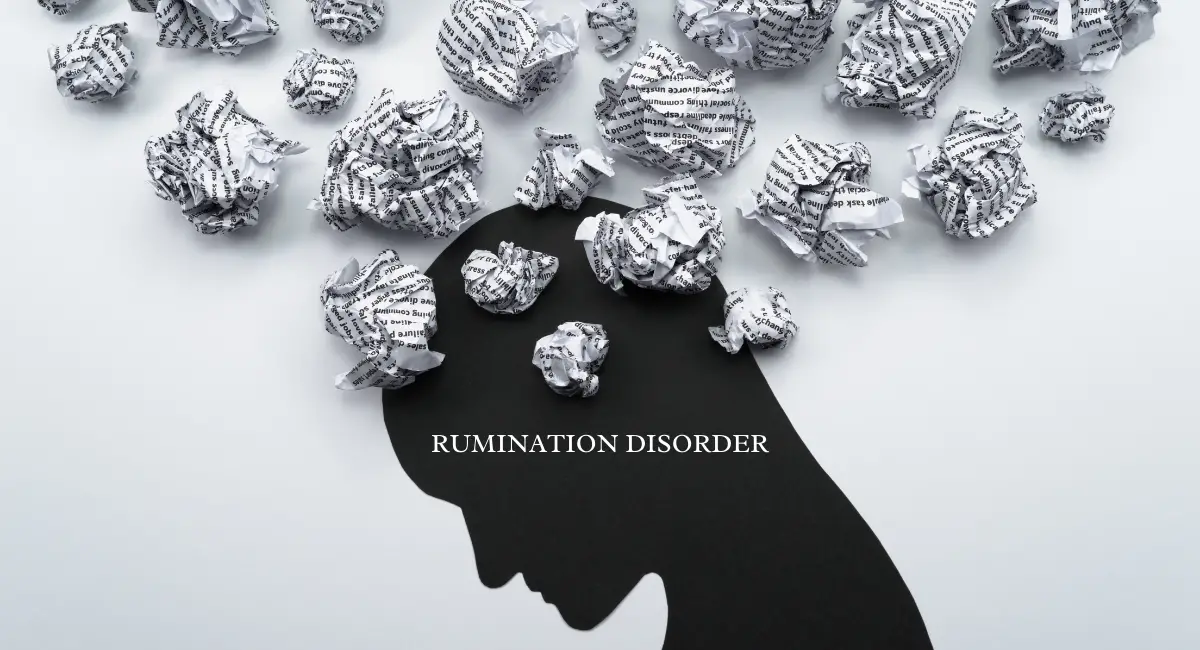
Rumination Disorder: Symptoms, Causes, and Therapy Options
Contents
Introduction
Rumination Disorder is a condition where individuals repeatedly regurgitate food after eating, re-chewing it, and either swallowing it again or spitting it out. This behavior is voluntary and differs from vomiting, as it does not involve nausea or any gastrointestinal illness. Rumination Disorder can occur across all age groups but is commonly seen in infants, children, and individuals with developmental disabilities.
According to the Diagnostic and Statistical Manual of Mental Disorders, Fifth Edition (DSM-5), Rumination Disorder is classified as a Feeding and Eating Disorder. If left untreated, the disorder can lead to malnutrition, weight loss, and social isolation. This article will explore Rumination Disorder, focusing on its Symptoms, Causes, and Therapy Options for effective treatment.
Common Symptoms of Rumination Disorder
The primary symptom of Rumination Disorder is the repetitive regurgitation of food after meals. Below is a table outlining the common symptoms of Rumination Disorder and examples of how they may manifest in daily life:
| Symptom | Description/Example |
|---|---|
| Repetitive Regurgitation of Food | Individuals regurgitate food shortly after eating, chew it again, and either swallow it or spit it out. For example, a child may regurgitate food after every meal, chew it, and swallow it again. |
| No Signs of Nausea or Illness | Regurgitation occurs without nausea, retching, or gastrointestinal discomfort. For example, a person may regurgitate their food during or after meals without feeling physically unwell. |
| Weight Loss or Failure to Thrive | Due to the frequent regurgitation of food, individuals may experience significant weight loss or difficulty gaining weight. For example, an infant with Rumination Disorder may fail to meet growth milestones. |
| Bad Breath and Dental Issues | Constant regurgitation can lead to chronic bad breath, dental erosion, or tooth decay. For example, repeated exposure to stomach acid can erode teeth, causing severe dental issues. |
| Avoidance of Eating in Public | Individuals may avoid eating in public to hide their regurgitation behavior. For example, someone may refuse to eat at restaurants to avoid embarrassment. |
| Mild Gastrointestinal Discomfort | Although not always present, some individuals may experience mild discomfort or bloating after eating. For example, an individual may feel a slight burning sensation in the throat after regurgitation. |
Causes and Risk Factors of Rumination Disorder
The exact causes of Rumination Disorder are not fully understood. The disorder is thought to result from a combination of behavioral, psychological, and physiological factors. Below are key causes and risk factors associated with Rumination Disorder:
1. Behavioral Factors
Rumination Disorder is often viewed as a learned or habitual behavior, especially in infants, children, and individuals with developmental disabilities. The repetitive nature of regurgitation can become self-soothing or comforting for the individual, reinforcing the behavior over time.
- The repetitive regurgitation of food may provide physical or emotional satisfaction, which can create a cycle where the behavior becomes habitual. For individuals with developmental disorders, this regurgitation may act as a form of self-stimulation.
- Infants or children with Rumination Disorder may begin regurgitating food in response to boredom, stress, or a desire for attention.
Jacob, a 5-year-old boy with a developmental delay, regularly regurgitates his food during meals. His parents have noticed that he repeats this behavior when he is anxious or overstimulated.
2. Psychological Factors
In some cases, Rumination Disorder may develop in response to psychological stressors. Individuals with anxiety, depression, or trauma may regurgitate food as a coping mechanism to deal with overwhelming emotions or distress.
- Emotional stress or psychological trauma can trigger Rumination Disorder in some individuals. Children may develop this behavior as a way to manage anxiety, particularly in situations that involve eating.
- In adolescents or adults, regurgitation may serve as a way to gain control in stressful environments, or it may stem from obsessive-compulsive tendencies.
Emma, a 15-year-old girl, began experiencing Rumination Disorder shortly after her parents’ divorce. Her therapist is working with her to manage her stress and reduce her regurgitation episodes.
3. Physiological Factors
While Rumination Disorder is not directly caused by gastrointestinal illnesses, some physiological factors may contribute to its development. Weakness or dysfunction of the esophageal sphincter, the muscle that prevents food from moving back up the esophagus, can make it easier for food to be regurgitated.
- A weak or dysfunctional lower esophageal sphincter can allow food to move back up the esophagus, but this is not the primary cause of Rumination Disorder. In most cases, the regurgitation is voluntary and related to behavioral patterns.
- Rarely, gastrointestinal conditions like gastroparesis (delayed stomach emptying) may exacerbate the symptoms of Rumination Disorder, but these conditions are not the underlying cause.
John, a 35-year-old man with Rumination Disorder, has been evaluated by a gastroenterologist to rule out any physiological causes. No structural abnormalities were found, and his treatment focuses on the behavioral aspects of his condition.
Therapy and Treatment Options for Rumination Disorder
Treating Rumination Disorder requires a multidisciplinary approach that addresses the behavioral, psychological, and physiological components of the disorder. Below are key treatment options:
1. Cognitive Behavioral Therapy (CBT)
Cognitive Behavioral Therapy (CBT) is one of the most effective treatments for Rumination Disorder. CBT helps individuals identify and change the thought patterns and behaviors that lead to regurgitation. The therapy focuses on retraining individuals to break the cycle of rumination by developing healthier responses to triggers.
Emma’s therapist uses Cognitive Behavioral Therapy (CBT) to support her in identifying and understanding the triggers that lead to her rumination, such as experiencing stress during mealtime situations. Through structured CBT sessions, Emma has learned to recognize the patterns of thoughts and emotions that contribute to her urges to regurgitate
2. Habit Reversal Training (HRT)
Habit Reversal Training (HRT) is a behavioral therapy technique specifically designed to help individuals break repetitive habits, including regurgitation. This therapy involves teaching individuals to become aware of the behaviors associated with rumination and replacing them with alternative actions, such as diaphragmatic breathing or mindful eating.
Jacob works with his therapist, who uses Habit Reversal Training to support him in overcoming his regurgitation behavior. Through this therapeutic approach, Jacob has learned to replace the urge to regurgitate with diaphragmatic breathing, a calming and controlled breathing technique
3. Relaxation Training
Relaxation Training can help individuals with Rumination Disorder manage the physical and psychological stressors that contribute to regurgitation. Techniques such as diaphragmatic breathing, progressive muscle relaxation, and mindfulness can reduce the anxiety and tension that often trigger rumination.
John incorporates Relaxation Training into his mealtime routine to address and prevent regurgitation episodes. During his meals, he actively engages in techniques such as deep breathing exercises and mindfulness practices, which help him stay focused, calm, and emotionally grounded. These strategies effectively reduce the likelihood of rumination by helping him manage stress and maintain better control over his body’s natural responses during eating
Long-Term Management of Rumination Disorder
Long-term management of Rumination Disorder requires ongoing therapy and lifestyle changes to prevent the recurrence of regurgitation behavior. Below are key strategies for long-term management:
- Consistent Therapy: Regular participation in CBT or HRT helps individuals maintain control over their rumination behaviors and address any underlying psychological issues, such as anxiety or stress.
- Mindful Eating Practices: Encouraging mindful eating can help individuals focus on the act of eating and reduce the impulse to regurgitate food. Mindful eating involves paying attention to the sensations of food, such as taste, texture, and fullness, to prevent regurgitation.
- Behavioral Reinforcement: For children or individuals with developmental disabilities, positive reinforcement can be used to reward appropriate eating behaviors and reduce regurgitation. Caregivers and therapists work together to reinforce healthy eating habits.
- Support Networks: Engaging with support groups or working with mental health professionals provides ongoing emotional and psychological support, helping individuals stay on track with their recovery.
Conclusion
Rumination Disorder is a serious feeding and eating disorder characterized by the repetitive regurgitation of food after eating. The behavior is voluntary and is not associated with nausea or gastrointestinal illness, but it can lead to significant health complications such as malnutrition, weight loss, and social withdrawal. With effective treatments—such as Cognitive Behavioral Therapy, Habit Reversal Training, and Relaxation Training—individuals can break the cycle of rumination and improve their physical and mental well-being. Long-term management strategies, including ongoing therapy and mindfulness practices, are essential for preventing relapse and ensuring sustained recovery.
References
- American Psychiatric Association. (2013). Diagnostic and Statistical Manual of Mental Disorders (5th ed.). Washington, DC: American Psychiatric Publishing.
- Chial, H. J., Camilleri, M., Williams, D. E., Litzinger, K., & Perrault, J. (2003). Rumination syndrome in children and adolescents: Diagnosis, treatment, and prognosis. Pediatrics, 111(1), 158-162.
- Tack, J., & Blondeau, K. (2010). Medical treatment of rumination syndrome. Expert Opinion on Pharmacotherapy, 11(17), 2673-2679.
- Mousa, H., Hyman, P., Cocjin, J., Alhajj, M., & Rowhani-Rahbar, A. (2003). Long-term outcome of behavioral therapy for pediatric rumination. Journal of Pediatric Gastroenterology and Nutrition, 37(5), 546-550.
- O’Brien, M. D., & Walker, L. S. (2012). Functional gastrointestinal disorders: Biopsychosocial concepts of etiology and treatment. Journal of Pediatric Psychology, 37(6), 579-592.
Explore Other Mental Health Issues








